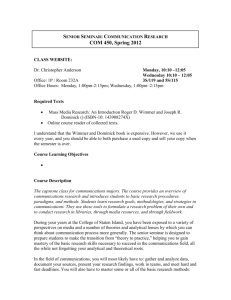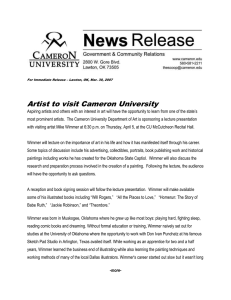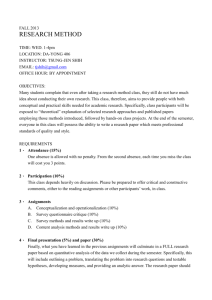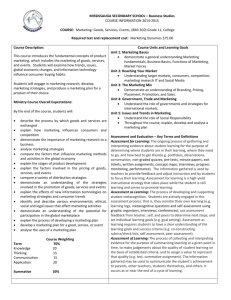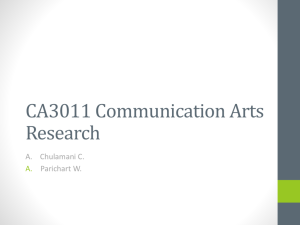Research Methods in Communications COMM
advertisement
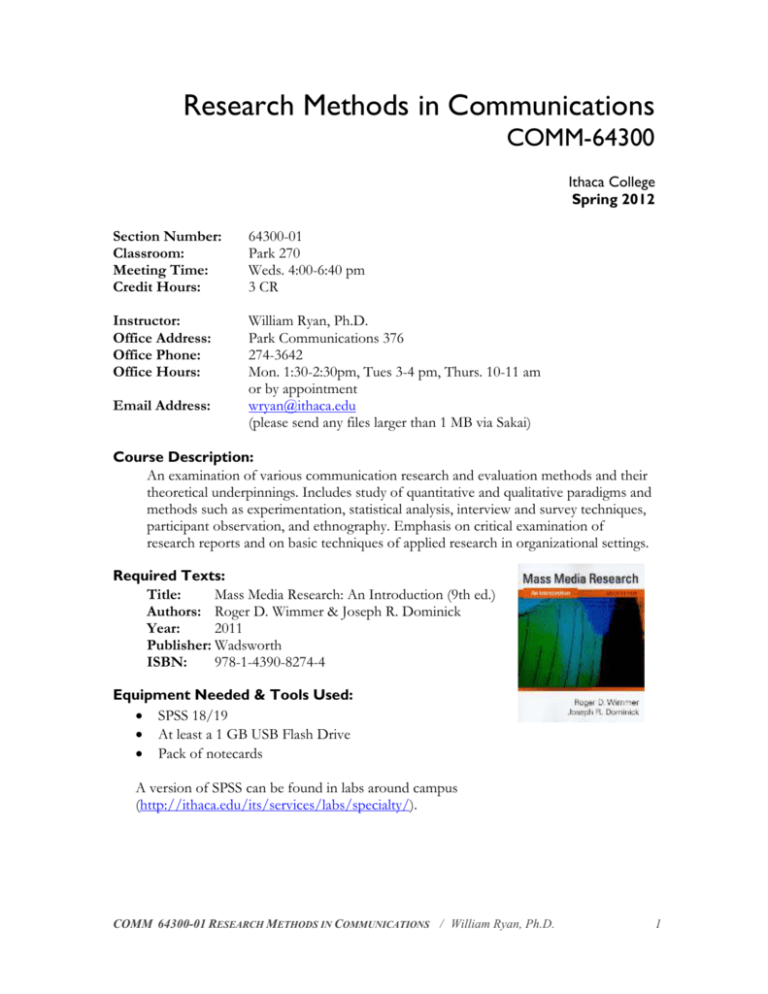
Research Methods in Communications COMM-64300 Ithaca College Spring 2012 Section Number: Classroom: Meeting Time: Credit Hours: 64300-01 Park 270 Weds. 4:00-6:40 pm 3 CR Instructor: Office Address: Office Phone: Office Hours: William Ryan, Ph.D. Park Communications 376 274-3642 Mon. 1:30-2:30pm, Tues 3-4 pm, Thurs. 10-11 am or by appointment wryan@ithaca.edu (please send any files larger than 1 MB via Sakai) Email Address: Course Description: An examination of various communication research and evaluation methods and their theoretical underpinnings. Includes study of quantitative and qualitative paradigms and methods such as experimentation, statistical analysis, interview and survey techniques, participant observation, and ethnography. Emphasis on critical examination of research reports and on basic techniques of applied research in organizational settings. Required Texts: Title: Mass Media Research: An Introduction (9th ed.) Authors: Roger D. Wimmer & Joseph R. Dominick Year: 2011 Publisher: Wadsworth ISBN: 978-1-4390-8274-4 Equipment Needed & Tools Used: SPSS 18/19 At least a 1 GB USB Flash Drive Pack of notecards A version of SPSS can be found in labs around campus (http://ithaca.edu/its/services/labs/specialty/). COMM 64300-01 RESEARCH METHODS IN COMMUNICATIONS / William Ryan, Ph.D. 1 Course Learning Objectives: By the end of this course, you will be able to: Write effective research questions to help address problems you wish to answer, as measured by classwork, assignments, and projects. Write a survey questionnaire properly and carry out survey research effectively, efficiently, and ethically, as measured by a survey assignment. Effectively conduct qualitative methods and analysis techniques, as measured by the observation and focus group assignments. Draw probability sample from a population and judge when a non-probability sample may be appropriate, as measured through the projects. Analyze quantitative data, as measured by take-home quizzes, survey assignment, and projects. Chose appropriately among a variety of different methods and approaches, as measured by the take-home quizzes and final project. Discriminate among sources of data based on reliability and validity, as measured through take-home quizzes and in-class discussions. Expectations/Guidelines/Policies: Attendance Policy All students at Ithaca College are expected to attend all classes. You are responsible for work missed during any absence from class. Please contact me no later than one week after the absence to make up work. You should notify me as soon as possible of any anticipated absences. Written documentation indicating the reason for your absence will be required. You may be excused for participation in College-authorized co-curricular and extracurricular activities if, in my judgment, this does not impair your or other students’ ability to succeed in the course. Important: Missing classes will affect your grade You are allowed two unexcused absences before your grade will be affected. Missing class means you do not show for the entire class. The grade reduction policy works in this way. Each unexcused absence over three will result in a lowering of your final course grade by a partial letter grade (e.g., B- to a C+). Extenuating circumstances: In accordance with New York State law, students who miss class due to their religious beliefs shall be excused from class or examinations on that day. I am responsible for providing you with an equivalent opportunity to make up any examination, study or work requirement that the student may have missed. It is strongly recommended you notify me at least one week before any anticipated absence of this nature so that proper arrangements may be made. Any such work is to be completed within a reasonable timeframe, as agreed on by us. Any student who misses class due to a verifiable family or individual health emergency or have been summoned to court shall be excused. You, your parent, or your legal guardian may report the absence to the Office of Student Affairs and Campus Life. This information will be disseminated to the appropriate faculty. You should, however, follow-up with your professors. Class Tardiness COMM 64300-01 RESEARCH METHODS IN COMMUNICATIONS / William Ryan, Ph.D. 2 You are expected to be to every class on time. Arriving late to class two times will equal one absence. Please plan ahead and allow yourself enough time for traffic and parking if you are off-campus and general travel to class. Classwork time The course and the client project require utilization of real-world technologies. You will need to use manuals, look up supplementary information on the Internet, practice, and struggle a bit on your own in developing your technology skills and understanding to complete the client project. I will do my best to help you during class time with SPSS and outside of class during office hours, but these sorts of hands-on activities are most effective when you *realize* the solution of a complex problem as opposed to being told. Furthermore, there are often multiple ways to work through these problems, the activities in this class can help you learn which work best for you. We will meet in Room 270 this semester. Although some worktime will be provided during class, you will need to spend additional time outside of class to work on projects. The labs will have sheets posted in both Room 270 and Room 275 showing when the labs are open for general use. There are also some other labs that may be available for use. You can find a list here: http://ithaca.edu/its/services/labs/public/. Facebook/Web/Computer/Cell Phone Use For the entire class period, I need you to be attentive to class activities and lecture. Although I am aware that you are quite adept at multitasking, I ask that you focus on one thing during class. I want to eliminate distractions during class. Facebook, web use, external computer use, and cell phone use is prohibited during the scheduled class time. I may require students to close their laptops and other portable devices, even if they are doing academic tasks related to this course, if distractions appear to be a problem for the class. Don’t ruin it for the rest of the class. Assignments and Due Dates All assignments must be ready to hand in at the designated time and place. For technical problems, assignments submitted online only may be submitted up to 11:59 pm on the day its due without penalty. The penalty will kick in at midnight the following day. All assignments handed in late will be reduced by 5% for every calendar day late after the time they are due. Safety You must respond to and report conditions and actions that may jeopardize your safety, or that of other people and/or equipment. Report to the responsible College employee. During class sessions that person would be your instructor or lab assistant. Outside of class the person might be your instructor, lab supervisor, co-curricular manager, equipment and facilities manager, or one of the engineering support staff. You must be aware that misuse of equipment or use of damaged equipment can create the risk of serious injury, infectious contamination, and expensive damage. You may be liable for damage or injury resulting from such use. Unsupervised use of facilities puts you at risk. Failure to be alert to safety problems, or to report them, may have serious consequences for you or others. Students with Disabilities In compliance with Section 504 of the Rehabilitation Act of 1973 and the Americans with Disabilities Act, reasonable accommodation will be provided to students with documented COMM 64300-01 RESEARCH METHODS IN COMMUNICATIONS / William Ryan, Ph.D. 3 disabilities on a case by case basis. Students must register with the Office of Academic Support Services and provide appropriate documentation to the college before any academic adjustment will be provided. To contact that office call 274-1005, or contact Leslie Schettino, Director of Support Services for Students With Disabilities, at lschettino@ithaca.edu. If you require extra time to complete quizzes and assignments, please contact your instructor at the beginning of the semester once you have registered with the Office of Academic Support Services. Academic Integrity You are encouraged to consult with your classmates as you work on projects and assignments (collaborations and cheating on quizzes and individual assignments will result in failure for all parties involved), but you are expected to turn in your own original work for each assignment. Using another student’s work on a project or assignment, cheating on an exam, or any other form of dishonesty or plagiarism will result in a grade of zero on that assignment and possibly an “F” in the course, and all parties involved will be referred to the Dean of Students. In a collaborative project, all involved students may be held responsible for academic misconduct if they are either knowing participants in plagiarism or complicitous. If you would like to review your rights and responsibilities as set out by the university, please visit http://www.ithaca.edu/attorney/policies/vol7/Volume_7-70102.htm. Plagiarism You are expected to submit your own work for reading responses, quizzes, blog entries, projects, and exams. Whether intended or not, plagiarism is defined as the unacknowledged use of someone else’s published or unpublished ideas. However, finding other sources supporting your claims or design decisions is perfectly reasonable as long as you properly cite the source that you are using. If you do bring in other sources, you are expected to add your own insights in addition to the text, diagrams, or designs that you incorporate into your design. This requires the following: Each quotation or paraphrase must be acknowledged with footnotes or in-text citation Direct quotations must be enclosed in quotation marks and be absolutely faithful to the wording of the source Paraphrased ideas be stated in language entirely different from the language of the source A sequence of ideas identical to that of a source be attributed to that source All sources the writer has drawn from in paraphrase or direct quotation must be listed at the end of the paper under “References,” or “Works Cited.” Plagiarism can involve not only written work but computer programs, photographs, artwork, films, videos, and audios. If you are at all unsure about what constitutes plagiarism, or how to give credit, see your instructor and consult the Student Handbook (see "plagiarism" in the index). Penalties for plagiarism may include: failure on the assignment and/or failure in the course and/or College academic discipline, which could mean suspension or dismissal from the College. COMM 64300-01 RESEARCH METHODS IN COMMUNICATIONS / William Ryan, Ph.D. 4 Course Grading Breakdown (500 Points Total) Take-Home Quizzes (3 x 25 points) 75 points Assignments Observation 60 points Focus Group 60 points Survey 60 points Projects Market Research Project 115 points Final Project on Topic of Interest 130 points Basic Grading Scale A (465-500) (93-100%) A(450-464) (90-92%) B+ (435-449) (87-89%) B (415-434) (83-86%) BC+ C C- (400-414) (80-82%) (385-399) (77-79%) (365-384) (73-76%) (350-364) (70-72%) F (<=349) (<=69%) Project & Assignment Descriptions Group Observation Assignment: You are going to observe a local store and their communication practices to their customers. What makes that communication particularly effective or ineffective? Assignment Due 2/29. Group Focus Group Assignment: You will learn about undergraduate perceptions and experiences of a series of ads from different brands. Assignment Due 3/21. Class Market Research Project: You are going to be analyzing the market for the real organization, VideoLink, to give them a sense of how new media organizations are using digital/internet video. They have asked a series of research questions that will require us to complete a content analysis of these organizations’’ websites and interview their employees. Everyone in the class will contribute to the overall project, but those who do not wish to participate may opt out and do a comparable project on their own. Interview and Content Analysis Plans Due 2/15. Sample Due 2/22. Research Instrument Due 2/22. Project Due 3/30. Group Survey Assignment: You will survey respondents about their preferences, habits, and attitudes toward social media. This project will also give you some practice using SPSS to analyze relationships of concepts. Assignment Due 4/20. Individual/Group Final Project: The final project will be an original work of research by either an individual or small group. Project Due 5/9. COMM 64300-01 RESEARCH METHODS IN COMMUNICATIONS / William Ryan, Ph.D. 5 Class Calendar This calendar is subject to change. Dates W 1/25 W 2/1 Lecture Topic Research Evaluations Scientific Method Ethics Concepts Measurement Validity & Reliability Activity Syllabus Schedule Assignment Due* Read Wimmer & Dominick [CH1 to p. 32, CH3] Project Info Conceptualization & Operationalization Brainstorm Guest Lecture: Kendra Davis, Director of Marketing, VideoLink Review Practice Read Wimmer & Dominick [CH2] Project Group Selection. Read Wimmer & Dominick [CH4] Division of Labor Due. Read Wimmer & Dominick [CH5 pp. 114-131 145-155] Submit Quiz 1 Read Wimmer & Dominick [CH5 pp. 132-145] Plan Due for Content Analysis and Interview Groups. Research Instruments Due for Content Analysis and Interview Groups. Sample Determined by Sample Group. W 2/8 Sampling W 2/15 Qualitative Research Qualitative Analysis Observation W 2/22 Interviews Focus Groups Method Practice W 2/29 Content Analysis Coding Practice Project Work Time W 3/7 Quantitative Research Experimentation Surveys Survey Practice SPSS Review W 3/14 W 3/21 Spring Break Quantitative Analysis Statistics Descriptives Distibutions Hypotheses Inference & Data Power & Effect Confidence Error W 3/28 SPSS Project Work Time Confidence Interval Calculation Power Analysis Read Wimmer & Dominick [CH6] Submit Observation Assignment. Read Wimmer & Dominick [CH7, CH9] Submit Quiz 2 Read Wimmer & Dominick [CH10] Submit Focus Group Assignment. Read Wimmer & Dominick [CH11] COMM 64300-01 RESEARCH METHODS IN COMMUNICATIONS / William Ryan, Ph.D. Marketing Research Deliverables Due 3/30 at 5PM. 6 W 4/4 SPSS W 4/11 t-tests Chi-Square Contingency Tables ANOVA W 4/18 Correlation SPSS Assignment Work Time W 4/25 Regression Choosing the right tests Review SPSS W 5/2 Applications Ethics Discussion of work contexts Project Work Time W 5/9 * Project Work Time * Wednesday, May 9, 4:00 – 6:40 pm SPSS Read Wimmer & Dominick [CH12 pp. 304-315] Read Wimmer & Dominick [CH12 pp. 315-319] Read Wimmer & Dominick [CH12 pp. 319-324] Submit Survey Assignment by 5 PM 4/20. Read Wimmer & Dominick [CH12 pp. 319-331] Submit Quiz 3 Read Wimmer & Dominick [CH15, 16] Final Paper Due 5/9 at 6:40 pm. *** Wimmer & Dominick books is a required text and all CH# in assignments reference the chapter number and may specify which pages are to be read for each chapter. COMM 64300-01 RESEARCH METHODS IN COMMUNICATIONS / William Ryan, Ph.D. 7
